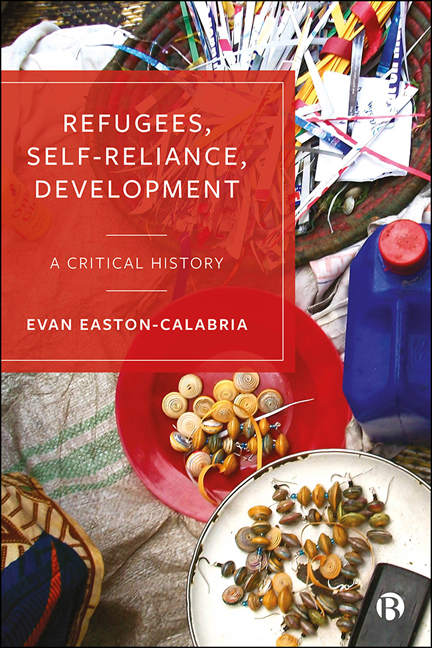Book contents
- Frontmatter
- Dedication
- Contents
- List of Figures and Tables
- Abbreviations and Acronyms
- Notes on the Author
- Acknowledgements
- 1 Introduction: Why Refugee Self-Reliance?
- 2 Self-Sufficiency out of Necessity: Refugee Self-Reliance Assistance in Interwar Greece
- 3 Socialism and Self-Reliance: Refugee Self-Reliance Assistance in Post-Colonial East Africa
- 4 Warriors of Self-Reliance: Refugee Self-Reliance Assistance in Cold War Pakistan
- 5 Dignity in Informality? Urban Refugee Self-Reliance Assistance in Kampala, Uganda
- 6 Livelihoods 2.0? Refugee Self-Reliance and the Digital Gig Economy
- 7 Conclusion
- Annex: A Note on Methods and Sources
- References
- Index
2 - Self-Sufficiency out of Necessity: Refugee Self-Reliance Assistance in Interwar Greece
Published online by Cambridge University Press: 12 October 2022
- Frontmatter
- Dedication
- Contents
- List of Figures and Tables
- Abbreviations and Acronyms
- Notes on the Author
- Acknowledgements
- 1 Introduction: Why Refugee Self-Reliance?
- 2 Self-Sufficiency out of Necessity: Refugee Self-Reliance Assistance in Interwar Greece
- 3 Socialism and Self-Reliance: Refugee Self-Reliance Assistance in Post-Colonial East Africa
- 4 Warriors of Self-Reliance: Refugee Self-Reliance Assistance in Cold War Pakistan
- 5 Dignity in Informality? Urban Refugee Self-Reliance Assistance in Kampala, Uganda
- 6 Livelihoods 2.0? Refugee Self-Reliance and the Digital Gig Economy
- 7 Conclusion
- Annex: A Note on Methods and Sources
- References
- Index
Summary
Introduction
On one mild day in October 1922, an American doctor named Ruth Parmelee arrived in Salonika, Greece. Although not her intended destination – she was meant to begin work in Smyrna after summer holidays in America – the activities she would undertake would become her life's main calling. ‘I now began, this time in Greece, a period of service which lasted thirty years’, she writes in the final sentence of her memoir. She was not the only new arrival who would stay so long. On 9 September 1922, the Turkish army entered the city of Smyrna, spurring on the start of a population transfer between Greece and Turkey that would eventually uproot over 1.5 million people. In the course of that month, hundreds of thousands of Ottoman Greeks and Armenians left Smyrna for Greece. That October, Dr Parmelee estimated that there were 100,000 refugees in Salonika alone, and these flows were just the beginning. ‘Many are flooding in from Thrace’, she wrote in a letter to friends in November. ‘[O] ne day we walked [to] the market to buy a loaf of bread, and were told that the bakeries were empty, because seven shiploads of refugees had just arrived.’
Over the following decades, through her prolific reports to the American Women's Hospitals’ headquarters and letter-writing to friends and families, Dr Parmelee became a documenter of the Greek-Turkish population exchange and its aftermath – notably of the emergency and development assistance provided to refugees. In the same letter to friends that November, she wrote:
This morning I saw evidence of the efforts on the part of the government to place families in the country where they may till the fields and make their living … Aside from attempts on the part of the government to find some sort of shelter for these bodies, they are giving daily food rations, and furnishing some facilities for medical care. The Greek government is working and doing all they can, although they are a bankrupt institution. But they cannot begin to do it all and need the cooperation of all the relief agencies available.
Beyond her role as a witness, Dr Parmelee became an active part of refugee relief and development work itself. As a doctor she directly assisted in emergency medicine, and in later years fought to open training schools for refugee nurses.
- Type
- Chapter
- Information
- Refugees, Self-reliance, DevelopmentA Critical History, pp. 25 - 58Publisher: Bristol University PressPrint publication year: 2022



